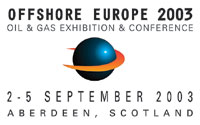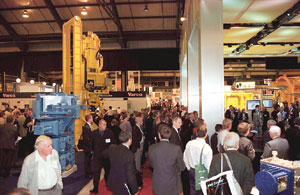Offshore Europe 2003
Offshore Europe will examine leadership and technology tactics
 How to “raise the game,” to meet significant challenges facing the global offshore industry, will be a dominant theme at the Offshore Europe 2003 Exhibition and Conference (OE 2003). This year’s event will be held Sept. 2-5 at the Aberdeen Exhibition & Conference Center (AECC), Aberdeen, Scotland. Celebrating the 30th anniversary of its inception, OE biennially attracts about 25,000 visitors from more than 70 countries. Earlier this year, AECC finished an £18-million ($27-million) redevelopment, just in time to handle more than 1,600 exhibiting companies, including several major oil companies. How to “raise the game,” to meet significant challenges facing the global offshore industry, will be a dominant theme at the Offshore Europe 2003 Exhibition and Conference (OE 2003). This year’s event will be held Sept. 2-5 at the Aberdeen Exhibition & Conference Center (AECC), Aberdeen, Scotland. Celebrating the 30th anniversary of its inception, OE biennially attracts about 25,000 visitors from more than 70 countries. Earlier this year, AECC finished an £18-million ($27-million) redevelopment, just in time to handle more than 1,600 exhibiting companies, including several major oil companies.
Attendees will enjoy several improvements at OE 2003. One is a new forum called Real Time Zone. There will also be expanded company “Intranet” registration for operators and contractors; increased targeting of independents; and greater VIP/international visitor promotion.
Real Time Zone. Remote Operations is an innovative, emerging technology sector, and it is also a key driver behind this year’s OE theme. It will be the centerpiece of a new, hands-on forum in refurbished Exhibition Hall B. Organizers have dubbed this forum the “Real Time Zone,” a show within a show that focuses on remote operations technology and expertise. It allows attendees to sample next-generation oilfield techniques and practices in an online, hands-on showcase.
 |
Close to 25,00 E&P professionals from 70-plus countries will attend OE 2003 in Aberdeen, Sept. 2 – 5
|
|
Plenary session. The keynote forum on Sept. 2 is entitled, “Raising the Game: Leadership, Behavior and Technology in Mature Basins.” Keynote speakers will include Walter van de Vijver, CEO of Shell E&P; either Steve Farris, CEO, or John Crum, Executive V.P. of Apache Corp.; and UK Energy Minister Stephen Timms.
More than ever, the upstream industry is challenged by cost, safety, the environment, technology, resourcing and competitiveness. To meet these challenges, E&P professionals must “raise the game.” This session will address so-called softer issues, primarily the challenge of leadership and behavior within, and between, companies and stakeholders. This refers to the optimal management of technology application and investment in mature basins.
PANEL DEBATES/ROUNDTABLE DISCUSSIONS
Seven panel debates and/or roundtable discussions will be staged from Tuesday, Sept. 2 through Thursday, Sept. 4. Each session will feature viewpoints of four to six participants that address timely subjects related to this year’s theme. Topics for these sessions are described below and listed in the program table.
Life begins at 40 – New business models to further develop mature basins. Chairman: Leo Roodhart (Shell Int’l. E&P). Moderator: Jeff Lund (Kerr-McGee North Sea UK). Panelists will represent BP, Cal Dive, Tuscan Energy, Baker Hughes, Lime Rock Partners and Venture Production.
This panel debate will examine the North Sea, where liquids production has peaked, gas output is falling, reserves replacement is low, and remaining opportunities are relatively small and technically challenging. Panelists will evaluate whether the North Sea becomes the domain of small independents, living off ever-maturing assets until abandonment, or will different, creative business models be used in this mature environment.
Competitiveness of international mature basins. Chairmen: Dave Ginger (Amerada Hess) and Andrew Hogg (Total E&P UK). This roundtable discussion will analyze factors that influence investment decisions in a basin. Participants will look at what makes some basins more attractive. They will define “competitiveness,” and discuss how it means different things to various stakeholders.
Competitiveness in the supply chain – Exportability of knowledge. Chairmen: Ian Lane (KCA Deutag Drilling) and Edward Jones (AMEC). Moderator: Mike Salter (Abbot Group). Panelists will represent AMEC, KCA Deutag, ChevronTexaco, Ernst & Young and World Bank. This panel debate will look at whether North Sea reservoir development and drilling techniques are exportable to other parts of the world. Conversely, they will debate whether the North Sea can learn from other mature basins, and determine how to transfer such knowledge.
Planning horizons – Impact on technology investment decisions. Chairmen: Mike Fleming (WellDynamics) and Andrew Thomson (Reservoir Management Ltd.). Speakers will represent; Shell International E&P, ENI, Wood Group and JMJ Associates. This roundtable discussion will identify the barriers to adopting new technology that ultimately would benefit reservoir engineers and asset managers. CAPEX minimization often wins out over value creation during life of asset.
Health, safety & environment, world-class systems – World class performance? Chairmen: Bob Kyle (UKOOA) and Ian Lane (KCA Deutag Drilling). Panelists will be from UKOOA, Shell UK E&P, Amicus and SMC UK. Although performance has improved significantly, and despite some of the world’s most comprehensive safety management systems, the UK’s HS&E performance does not always compare favorably with other regions. This panel debate will identify pockets of excellence and determine what else must be done to bring the UK sector up to world-class standards.
Industry initiatives in leading and delivering change – Are they working? Chairmen: Steve Harris (UKOOA) and Dave Workman (Tuscan Energy). Speakers will represent DTI, The Industry Technology Facilitator, Kon-Kraft, Halliburton, PGL, Schlumberger and BP. Across the world, governments are withdrawing from running industry, and corporations must take on roles that formerly were state business. This has led to cooperative projects between industry and governments, like the UK’s Pilot and Norway’s Kon-Kraft. Participants will look at the effectiveness of such initiatives and to what extent a government can influence a global business locally.
Cross-industry learning – Examples from other industries on how leadership, behavior and technology have delivered a breakthrough. Chairmen: Edward Jones (AMEC) and Steve Harris (UKOOA). The North Sea’s maturity has bred reduced expenditures and an increasingly competitive environment. Established companies have exited, and new operators have entered. Good opportunities remain for innovative firms that can adapt to change. This session highlights companies that have “broken the mold” and delivered a step change.
TECHNICAL SESSIONS
There will be six technical sessions held from Tuesday afternoon through Thursday. Highlights of each technical theme are noted below.
Drilling and completions. Authors from three oil companies, a contractor and a manufacturer will present case history papers on a variety of timely drilling topics. These will include North Sea usage of slimhole, rotary steerable systems; redefinition of applications for horizontal openhole gravel-packing in deepwater completions; implementing high-rate acid stimulation in a subsea intelligent completion; a wells-up approach to drilling facility design; and experience with through-tubing rotary drilling and cementing challenges in the North Sea.
Reservoir engineering. Papers will be presented by lead authors from BP, Shell, Total, Kuwait Oil Co. and Institute of Petroleum. Topics will include integrating 4D seismic into reservoir management with horizontal wells; plateaued production at Valhall field after 20 years; relative permeabilities for post-waterflood depressurization; fluid modeling and upscaling at Smørbukk field; correlation of gas-condensate relative permeability with production rate; and lessons learned from field monitoring in Kuwait.
Formation evaluation. Six papers from oil company and equipment/service authors detail the benefits gained from using advanced seismic, geophysical and imaging techniques in complex reservoirs. Subjects include single-sensor seismic acquisition in a highly complex reservoir; production geophysics at Brage field; optimizing horizontal well placement at Otter field; identifying complex gas-liquid flow regimes in a horizontal well; use of a finite difference sector model in well testing; and transient pressure behavior in dual lateral wells.
Production engineering. Subsea production and processing, along with software advances, dominate this session. Among the topics are retrofitting subsea processing for EOR; supersonic gas conditioning; a slug suppression system; real-time optimization of producing systems; development of Otter marginal oil field; advanced web technologies for production enhancement; and automated reservoir surveillance.
Performance and related topics. A UK-dominated author group presents papers on EOR implementation, improvement of development performance, management techniques and technology transfer. The six papers focus primarily on case examples from the UK sector of the North Sea.
Health, safety and environment. Operators and contractors will present most of this wide-ranging session. Topics include health risk assessment and monitoring; the North West European HSE case; the influence of leadership and behavior on safety; the role of thrust in safety culture; life-of-field energy usage; and striving for zero environmental impact from produced water. 
| |
Table 1. Offshore Europe 2003 conference sessions |
| |
Tuesday |
|
|
|
|
|
| |
Plenary session |
10 a.m. – 12:30 p.m |
|
| |
|
Raising the game: Leadership, behavior and technology in mature basins |
|
|
| |
Panel debate |
2 p.m. – 5:30 p.m. |
|
| |
|
Life begins at 40 – New business models to further develop mature basins |
|
|
| |
|
|
|
| |
Drilling and completions |
2 p.m. – 5:30 p.m. |
|
| |
Reservoir engineering |
2 p.m. – 5:30 p.m. |
|
| |
Wednesday |
|
|
|
|
| |
Formation evaluation |
9:30 a.m. – 1 p.m. |
|
| |
Roundtable discussion |
10 a.m. – 1 p.m. |
|
| |
|
Competitiveness of international mature basins |
|
|
| |
Panel debate |
2 p.m. – 5:30 p.m. |
|
| |
|
Competitiveness in the supply chain – Exportability of knowledge |
|
|
| |
Production engineering |
2 p.m. – 4 p.m. |
|
| |
Roundtable discussion |
2 p.m. – 5:30 p.m. |
|
| |
|
Planning horizons – Impact on technology investment decisions |
|
|
| |
Thursday |
|
|
|
|
|
| |
Panel debate |
10 a.m. – 12:30 p.m. |
|
| |
|
Health, safety & environment, world-class systems |
|
|
| |
|
– World class performance? |
|
|
| |
Performance and related topics |
9:30 a.m. – 1 p.m. |
|
| |
Roundtable discussion |
10 a.m. – 12:30 p.m. |
|
| |
|
Industry initiatives in leading and delivering change |
|
|
| |
|
– Are they working? |
|
|
| |
Panel debate |
10 a.m. – 12:30 p.m. |
|
| |
|
Cross-industry learning – Examples from other industries on how leadership, behavior and technology have delivered a breakthrough |
|
|
| |
Health, safety and environment |
2 p.m. – 5:30 p.m. |
|
|
|

 How to “raise the game,” to meet significant challenges facing the global offshore industry, will be a dominant theme at the Offshore Europe 2003 Exhibition and Conference (OE 2003). This year’s event will be held Sept. 2-5 at the Aberdeen Exhibition & Conference Center (AECC), Aberdeen, Scotland. Celebrating the 30th anniversary of its inception, OE biennially attracts about 25,000 visitors from more than 70 countries. Earlier this year, AECC finished an £18-million ($27-million) redevelopment, just in time to handle more than 1,600 exhibiting companies, including several major oil companies.
How to “raise the game,” to meet significant challenges facing the global offshore industry, will be a dominant theme at the Offshore Europe 2003 Exhibition and Conference (OE 2003). This year’s event will be held Sept. 2-5 at the Aberdeen Exhibition & Conference Center (AECC), Aberdeen, Scotland. Celebrating the 30th anniversary of its inception, OE biennially attracts about 25,000 visitors from more than 70 countries. Earlier this year, AECC finished an £18-million ($27-million) redevelopment, just in time to handle more than 1,600 exhibiting companies, including several major oil companies.

